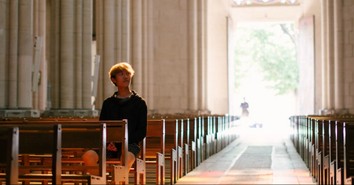What Makes the Christian Giver Unique?

Editor’s Note: As you consider giving to one of the Tsunami relief funds, please take a moment to read this commentary about "good works” and the love of Christ.
What separates the good deeds of Christians from the good deeds of others? This question cuts to the heart of Christian outreach. It is the root of other similar inquiries: Who do we help? Is Christ evident in what we are doing?
This struggle wrestled with throughout the Christian community. Many times, how one answers is more a glimpse of their own personal preferences, personality, and theological understanding than based on true study of God’s Word and reverence to His plan.
I have witnessed and participated in the debate of these questions both as a leader in my local church and in my occupation with World Relief, the relief and development arm of the National Association of Evangelicals.
Who do we help?
As chairpersons of local missions for our church, my wife and I are constantly approached by good men and women of faith who desire to live out Christ command to help the poor and the needy. We also receive many requests from those in need, most with legitimate needs, who are living in dire circumstances. There are people who are unable to lift themselves up and out of their circumstance without the help of others, having received one tragedy after another in their lives. Many of us have faced those times ourselves.
Unfortunately, we have also seen our fair share of those whose need is questionable. Early in our tenure, after providing assistance to a few that were unappreciative, rude and unwilling to help themselves, we began to question just how much Christian love we are supposed to share?
We thought we knew the answer and turned to God’s Word to justify it. We turned to the story of Jesus going to the pool in Bethesda. At this particular pool, an angel would occasionally come and stir the waters and whoever stepped into the pool first would be healed. A great multitude of people who were sick, lame, or paralyzed lay about the pool, waiting. Jesus walked up to a man who had been lying there for a long time…for 38 years! Jesus asked him, “Do you want to be made well? (John 5:6b, italics added) The man’s response was weak, “Sir, I have no man to put me into the pool when the water is stirred up; but while I am coming, another steps down before me.” (John 5:7) Again, 38 years! Jesus’ response was not the one I was looking for. For Jesus healed him anyway, showing him grace, even when the man made no attempt to help himself.
The story doesn’t end there. A few verses later we find that the Jewish leaders are questioning the man, wanting to know who was healing on the Sabbath. When it was discovered that it was Jesus, we are told, “For this reason the Jews persecuted Jesus, and sought to kill Him, because He had done these things on the Sabbath.”
This one good deed, bestowed upon the one person at the pool who might have been the least deserving, was a key part of God’s plan for the salvation of all!
Is Christ evident in what we are doing?
At World Relief, we’ve started programs in the neediest areas of the world resulting in the transformation of the lives of millions. Our programs in health, education, agriculture, refuge and trade are recognized by governments and other agencies as some of the best in the relief and development field. Our core strategy is to work alongside the local, indigenous church in implementing our programs. In some cases, the people receiving the care and support see it coming from the local church; not even recognizing World Relief’s presence. We believe in empowering the church to fulfill its mission of helping the poor and the needy. We have been doing this for 60 years, so you would think we could easily answer the question posed. Yet we struggle internally as to which of our programs reflect Christ and which are just good deeds.
When we first began working in Cambodia in 1992, there was no local church to work alongside. Christians only make up a fraction of a percent of the entire population. Some of our staff was not Christian. We launched a micro-enterprise development program called CREDIT to spur economic business development in post-conflict Cambodia. At that time, an outside visitor would be hard pressed to see Jesus at work. With no outward signs of evangelism, no printed materials explaining whom we represent, one could have easily questioned our activities. What separated us from any other organization?
The story doesn’t end there. With the support of the microfinance staff, a creative missionary, and several Christian volunteers, World Relief was able to start Hope for Cambodia’s Children. It was an opportunity to offer Bible stories, Vacation Bible School programs and health education to the children of CREDIT’s clients. It was the microfinance program's reputation that led mothers to entrust their children to this other World Relief program. The evangelical activities of Hope for Cambodia's Children are directly linked to the creation of over 300 house churches in Cambodia, a country that has historically been resistant to Christian evangelism.
What separates us?
So what separates the good deeds of Christians from the good deeds of others? It is the love of Christ. It is not the work being done; it is the heart of the person doing the work. The fulfillment of God’s master plan is not based on the good works of Christians. In fact, as Joseph realized, God uses every situation and circumstance. “Even though you intended to do harm to me, God intended it for good, in order to preserve a numerous people, as he is doing today.” (Gen 50:20)
We do good works to show the lost the loving hand of God. We do good works to offer hope to others, so they can recognize the power that resides in our hearts – and realize that power is freely available to them. When the receiver of assistance asks “Why are you helping me?” what benefit do they receive when the answer is “Because we feel every person deserves a chance” or “Because it is the right thing to do”? This fragile hope is based on human kindness, which will eventually fail them, plunging them back into darkness. Yet when the answer is “Because Jesus loves you”, the hope is anchored to an everlasting truth that will never falter.
Defining Your Ministry
This does not mean you need to be involved in every opportunity, task or outreach that comes your way. A person that tries to do everything accomplishes nothing. As the body of Christ, we are taught that we all were formed for certain tasks. Ask God to help you discern what area of ministry you have the gifts and talents to excel and pour yourself into that ministry.
At World Relief, we focus on programs that engage the local church, are transferable in ownership to local volunteers and fulfill our mission. By remaining focused, we are able to produce a greater impact in the communities we work and fulfill the expectations of our donors. Most importantly, our work is covered in a blanket of prayer. Our church partners, donors, and staff members regularly pray that our efforts bring glory to God.
Above all else, keep God central in all you do and one day you will hear those precious words, “Well done, good and faithful servant.”
World Relief works in more than 20 countries in relief and development through microfinance, disaster response, refugee resettlement, food security, child development, maternal and child health and HIV/AIDS prevention and care. World Relief is the humanitarian arm of the National Association of Evangelicals, its mission is to alleviate human suffering and poverty worldwide. World Relief programs serve everyone in need, regardless of religious affiliation. Visit www.worldrelief.org.
Originally published January 03, 2005.




